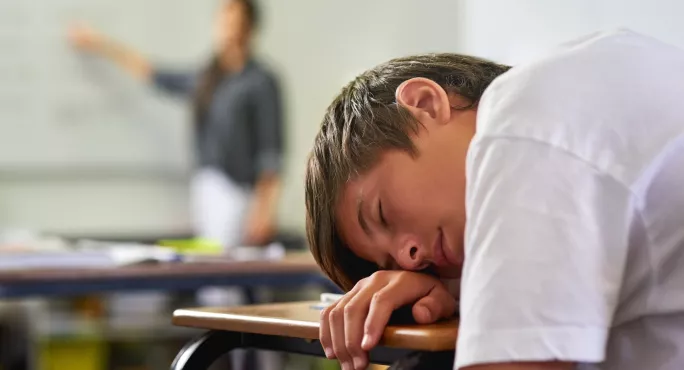It is 8.45am on a Friday. My, usually chirpy and chatty (in a nice way) geography class are trudging their way into my room with an almost sombre air.
Is there an assessment today?
Has the weekend been cancelled?
Are the holidays cancelled?
No. It’s Friday, it’s not even 9 o’clock and for the most part they’re running on somewhere between six and eight hours’ sleep: they’re shattered.
Sleep is a crucially important part of making sure you’re ready to learn on a day-to-day basis. When we’re growing, we need around 9.5 hours of it a night. However, most teenagers only get between 7 and 7.5.
OK, there are solutions to this problem, and here starts the PSE (personal and social education) lesson:
• Go to bed earlier,
• Keep your bedroom dark,
• Limit ‘screen time’ before bed,
• Avoid other stimulating activities,
• Avoid stimulants like tea/coffee before bed,
• Try to do some relaxing activities like a bath or mindfulness exercises.
This is all excellent advice and there really is a lot in there for all of us, not just teenagers, to consider in our evening routines.
Long read: We need to wake up to teenage sleep problems
Covid: ‘Our students aren’t lazy - they just need more sleep’
Research: More than a quarter of pupils not getting enough sleep
Tired students: ‘We need to teach pupils the importance of sleep’
Sleep patterns: How much sleep do teenagers really need?
How to fall asleep at night: 3 tips for teachers
But. (There had to be a but.) Are we really answering the question here? We’re picking a fight with biology, and, as any biology teacher will tell you, this is generally a bad idea.
Adolescence is a time of huge change, and our brains change along with the rest of us. Our circadian rhythm, the part of your brain activity that tells you when to sleep, changes. It’s all well and good telling someone to go to bed earlier, but if you’re not tired then you’re not tired.
So, what could we do? We agree that getting the right amount of sleep is important. Simple maths tells us if the average teenager starts to feel tired at around 11pm and they need 9.5 hours sleep, they shouldn’t be expected to wake until 8.30am.
Try and fit your whole morning routine in 15-20 minutes - it would be some morning, wouldn’t it? If we have our students’ best interests at heart, what do we do?
This: we open schools later, shifting the school day back an hour from 9am-3.30pm to 10am-4.30pm.
Would this fix every issue around sleep in teenagers? No, but it would be a start.
Sadly, it won’t happen. Why? Because it requires us to change.
In education, we are excellent at coming up with ideas that will help our students, providing they’re the ones who change. If we need to change to benefit our students? Suddenly, progress becomes much slower.
This issue only gets worse if we consider that what would really be for the best is to have primary and secondary schools opening and closing at different times, given that the sleeping patterns of a seven-year-old are vastly different to those of a 15-year-old.
The idea of having primaries running from 9am to 3pm and secondaries from 10am to 4.30pm would be seen by many, perhaps even most, as madness. But it makes sense, if we’re doing things for the benefit of our students.
Sadly, however, often we’re not. We run the “traditional” 9am to 3.30pm (or thereabouts) school day largely because it works with the 9am to 5pm working day - OK, we let students finish a bit early, but they’re still kids, after all.
The timeframe of the school day is, as with many things in education, designed primarily to prepare students for a life of work, which is something, I suppose. But wouldn’t it feel better to use school to prepare them for life instead?
Brian Donlin is a secondary teacher in Scotland
